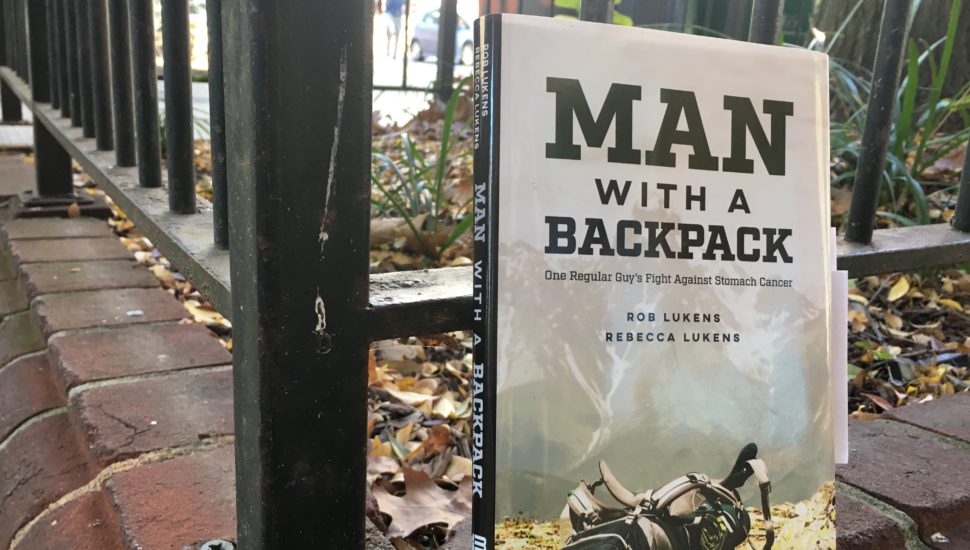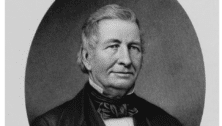Book Review: A Heartbreaking Work of Staggering Honesty

Rob Lukens’s first funeral after he learned he had stomach cancer wasn’t his own. It was his grandmother-in-laws. But as he and his family sat silently crying near her flowery casket, they all understood that the elephant in the room belonged to him.
“Although none of us actually said it, we all knew that we cried about me and not my wife’s ninety-eight-year-old grandmother in the casket at the front of us. It was about me. All the talk about meeting Jesus and being with dead loved ones, the cheesy organ sound, the songs, the testimony–it all resonated because we knew that I could be up there in a casket pretty soon,” writes Rob Lukens in his posthumously published autobiography ‘Man With a Backpack’.

I never knew Rob personally, but after reading his book (his wife Becky saw it to completion) I think he would agree that one of the worst things about cancer is that it obscures its victim. It hides the person it afflicts.
If ‘Man with a Backpack’ is anything, it’s a book that seeks to correct that. We are given access to Rob’s thoughts, feelings, fears, desires—all of it. No stone unturned.
We’re there with Rob as he searches through history to find a figure to draw strength from. Someone who survived stomach cancer and went on to have a life where he could still provide for his family and community.
Rob writes every detail. He’s angry at himself for not opting for a more expensive life insurance plan. He obsesses about the future. Will his wife be okay? Where is
she most likely to meet a good replacement husband? What about the children?
And sadly, this is an historian’s account of what it’s like to have your body and life ravaged by cancer. Rob takes us through his horrific surgery and the spiritual and
physical pain that followed. He even details the struggle to enjoy his family and the happy moments.
“Cancer casts a pall over everything,” he writes.
But that’s not to say Rob’s telling is without its moments of comedy.
Hours after his diagnosis Rob is sulking around the house, cataloging the family pets that are likely (he thinks) to live longer than him: the half-blind dog, his two goldfish Lefty and Righty.
Thanks to a putrid snail, we are told a few chapters later, Rob outlives the goldfish.
“Small victories,” he writes.
There’s a good Fall. Rob spends time with friends. He’s able to have a couple beers. He feels healthy.
Perhaps it was during this time that he wrote some of the most moving chapters of the book, the ones he addresses to his young children, Abbie and Finn.
“Just know that I love you and will always love you even if I’m gone. I will always be there for you providing inspiration, love, and a place to go when you are sad.”
And then, for a mysterious reason, Rob’s health begins to worsen. He’s having trouble gaining weight. He’s unable to keep food down.
In one terrifying and disorienting chapter we learn that Rob feared his worsening health was the result of a growing dependence on the high-power pain killers he needed to still the intense day-to-day pain.
From there things move very quickly. Rob get’s sicker. He’s hardly able to write at all. They discover the cancer has spread.
In the last months of his life Rob suffered greatly. Aside from his family and friends, there was one thing that brought him comfort–a vision of an adventurer. Someone who could lead him through the wilderness of his illness and would ultimately give this moving book its title.
I won’t spoil it. But I will recommend that anyone who knew him read this book. It might be difficult. But it will be worth it. I only wish Rob had enough time to write more.
_____
Connect With Your Community
Subscribe to stay informed!
"*" indicates required fields

























![95000-1023_ACJ_BannerAd[1]](https://vista.today/wp-content/uploads/2023/03/95000-1023_ACJ_BannerAd1.jpg)






















